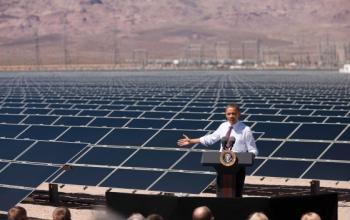President Obama’s recently announced energy and environment policies have been tried in many countries, always with the same result: abject failure. Yet when critics point this out, explaining that the U.S. economy will lose millions of jobs and billions of dollars in growth, Obama simply waves their objections away:
“Let’s face it,” the president answers. “That’s what [critics] always say.… Every time … the warnings of the cynics have been wrong.”
Obama Following Europe’s Failures
Other leaders, especially those in Europe who are further down the green path than is America, know better.
The deputy leader of the German Green Party in the Bundestag, Oliver Krischer, summed up the dangers of relying on green power when he said, “A few years ago the renewable sector was the job miracle in Germany; now nothing is left of all of that.”
Every European economy that followed the green agenda has faltered badly. Consequently, Germany is building coal plants to replace both failed wind power sources and even clean nuclear plants that are a casualty of irrational phobia after the Fukushima nuclear accident. In 2013 alone, Germany built six more coal plants. China and India build four new ones every week, rendering Ontario’s coal shutdown, as well as those planned for the United States, completely irrelevant from a climate perspective no matter what one believes about the science.
Rise of Strong
Obama’s dangerous climate and energy policies rely peripherally upon the reports of the United Nations Intergovernmental Panel on Climate Change (IPCC). This is the climate science agency created by Canadian billionaire Maurice F. Strong through the United Nations Environment Program (UNEP). It is instructive to review how Strong’s actions ruined Ontario, since Obama is taking America down a similar path.
Strong was UNEP’s first head and, while in this position, convened the first international expert group meeting on climate change. Strong then foisted the IPCC onto the world at the Earth Summit (officially, the United Nations Conference on Environment and Development [UNCED]) in 1992 in Rio de Janeiro, chairing the conference as UNCED conference secretary-general.
Canadian Poverty Path
This was the same year left-leaning New Democratic Party premier Bob Rae appointed Strong to run Ontario Hydro, the major power producer for the province. Strong immediately applied the UNEP’s philosophy and policies designed to demonize carbon dioxide (CO2) as the byproduct of fossil fuel-driven industries and nations, very much as Obama is doing right now in the United States. A magazine article titled “Maurice Strong: The new guy in your future” explains what he did at Ontario Hydro:
“Maurice Strong has demonstrated an uncanny ability to manipulate people, institutions, governments, and events to achieve the outcome he desires. Through his published writings and public presentations he has declared his desire to empower the UN as the global authority to manage a new era of global governance.… The fox has been given the assignment, and all the tools necessary, to repair the henhouse to his liking.”
Strong used Ontario Hydro’s massive debt, ostensibly created by building nuclear power plants, to eliminate fossil fuels, transforming Ontario from a “have” province contributing to the wealth of the Canadian federation to one that now relies on the rest of the country for financial handouts. It was obvious that this was coming. In 2008, then-Canadian Minister of Finance Jim Flaherty forecasted:
“If this continues—this is not hyperbole, this is a fact—Ontario will become a ‘have not’ province in confederation. And it will be Premier [Dalton] McGuinty’s legacy that he in two terms took Ontario from being the strongest economic province in the federation to a ‘have not’ province.”
Becoming a Global Leader
After the Earth Summit, Strong, by then adviser to presidents, prime ministers, and powerful corporations, continued to take a leading role in efforts to implement the outcomes of agreements reached at UNCED, through:
• the establishment of the Earth Council;
• the establishment of the Earth Charter movement;
• his chairmanship of the World Resources Institute;
• his honorary board membership with the David Suzuki Foundation;
• membership on the board of the International Institute for Sustainable Development, the Stockholm Environment Institute, the Africa-America Institute, the Institute of Ecology in Indonesia, the Beijer Institute of the Royal Swedish Academy of Sciences, and others; and
• membership in the World Conservation Union (IUCN), the World Wildlife Fund, and the China Carbon Corporation.
Strong’s Underlying Objectives
We got a glimpse of what may be Strong’s underlying objectives when he told a reporter, supposedly concerning the plot of a book he would like to write:
“What if a small group of world leaders were to conclude that the principal risk to the Earth comes from the actions of the rich countries? And if the world is to survive, those rich countries would have to sign an agreement reducing their impact on the environment. Will they do it? The group’s conclusion is ‘no.’ The rich countries won’t do it. They won’t change. So, in order to save the planet, the group decides: Isn’t the only hope for the planet that the industrialized civilizations collapse? Isn’t it our responsibility to bring that about?”
Strong worked toward achieving this goal by creating the IPCC and other organizations that supposedly demonstrated CO2 from human industrial activity is causing runaway global warming. Strong admitted he couldn’t implement his plan as a politician, so, according to author Elaine Dewar (Cloak of Green), “Strong was using the U.N. as a platform to sell a global environment crisis and the Global Governance Agenda.”
Truth Came Out
Ontario’s energy policy failures intensified to the point that, by November 2010, even the left-leaning Toronto Star newspaper admitted it:
“The McGuinty [Ontario] government has a major electrical power problem, one created by its decision to use the power system as a political policy tool. This policy has resulted in the doubling of rates in Ontario to a level higher than in most U.S. states. Ontario’s former industrial advantage has disappeared, while the government has been pretending that nothing is wrong.”
Ontario’s economy continues to decline today, largely due to the government’s decision to turn off the province’s cheapest form of electricity—coal. In 2003, coal provided 25 percent of Ontario’s power. By mid-April 2014, coal had been completely phased out. Replacing hydrocarbon fuel energies with alternate energies drove Ontario’s costs through the roof and created a multitude of other problems.
This is precisely where the United States is now headed, only it will be worse since Ontario still benefits from Canada’s policy of financial equalization between provinces, whereas there is no one who will bail out the United States.
‘Climate Science Is Politics’
Many commentators knew the United States was in trouble when Obama, then the frontrunner in the 2008 Democratic Party presidential primaries, told the San Francisco Chronicle:
“If somebody wants to build a coal-powered plant, they can. It’s just that it will bankrupt them because they’re going to be charged a huge sum for all that greenhouse gas that’s being emitted.… Under my plan of a cap and trade system, electricity rates would necessarily skyrocket.”
Contrary to popular belief, the IPCC evidence doesn’t actually support the claim that CO2 produced by human activities is causing dangerous climate change. There is no scientific case for a need to replace fossil fuels.
Indian Union Environment Minister Jairam Ramesh summed up the situation well, saying, “Science is politics in climate change; climate science is politics,” and we are being “led by our noses by Western [climate] scientists who have less of a scientific agenda and more of a political agenda.”
Western politicians like Obama are promoting energy policies based on falsified, politicized science and advocacy of alternative energies that don’t work. Maurice Strong, creator of the myth of CO2-caused dangerous climate change, applied his claims in Ontario, and the result was disastrous. The U.S. president’s energy policies are the same but more inexcusable since everyone can see what has already happened in Europe and Ontario. Why repeat this tragedy in America?
Tim Ball, Ph.D. ([email protected]) is a geologist and author of The Deliberate Corruption of Climate Science. Tom Harris ([email protected]) is executive director of the International Climate Science Coalition. This article first appeared at PJ Media, reprinted with permission.






